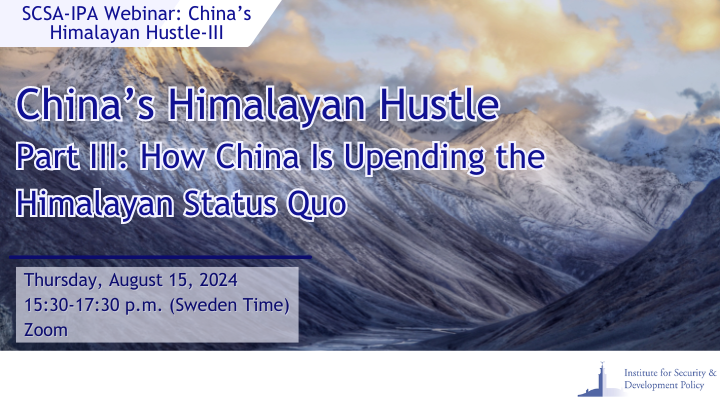China’s Himalayan Hustle – Part III: How China Is Upending the Himalayan Status Quo

Did you miss this webinar? The full recording is available on ISDP’s YouTube channel.
In the past couple of decades, China’s military and economy might have increased phenomenally. This has resulted in China utilizing a combination of its growing military-economic means, often coercively through financial incentives to already enfeebled or smaller developing economies, to increase its diplomatic reach globally, multilaterally, and regionally. Nowhere is this overreach more apparent than in the Asian sub-region considered the traditional backyard of India’s political power, namely South Asia, particularly among the Himalayan states of Bhutan, Nepal, and Pakistan – two of these states are members of China’s coveted Belt and Road Initiative (BRI). It would not be an overstatement that China is looking to upend the status quo in South Asia, and by extension in the Himalayan region.
In this context, China’s most hostile and competitive relationship is with India: Their long-standing border disputes almost reached a crescendo with the 2020 Galwan Valley conflict; and the two are currently undergoing their “most difficult” phase. India is unwilling to separate the issue of border hostilities and wider cooperation with China, on China’s terms, as reiterated by China on multiple occasions. It does not matter that China and India are together part of major non-Western forums like the Shanghai Cooperation Organization (SCO) and BRICS. One of the prominent aims for China is to supplant India as the traditional regional security provider and its influence to leverage greater control over border issues and showcase its unrivaled edge as a Himalayan hegemon. India’s burgeoning relationship with both the US and Europe, among other Indo-Pacific partners, is to some extent countering the permanent China threat; and certainly unnerving China. But are the other Himalayan neighbors on the same page vis-à-vis China?
With Bhutan, China does not have a formal diplomatic relationship – the only Himalayan state. Moreover, China’s territorial expansionism and its attempts at changing the Himalayan status quo is most visible in Bhutanese territories along the borders. The Doklam stand-off at the Bhutan-China-India tri-junction – the Plateau is generally considered part of Bhutan – in 2017 was neither the first nor the last attempt at Chinese transgression on Bhutanese territory. In the years since, China has claimed further territories (e.g., a wildlife sanctuary); been building largely military infrastructure, from roads to helipads; and settling “dual-use” villages. At the same time, Bhutan has signed a historically significant “Three-Step Roadmap” with China, which may unsettle India’s position and strengthen China’s intimidation tactics. The question however is, will Bhutan, a seemingly neutral state, play ball to a united West-India partnership against China?
For Pakistan, China’s economically dependent “all-weather” ally, it is clear that the allegiance to China is linked to the financial incentives of the BRI and projects like the controversial China-Pakistan Economic Corridor (CPEC) even as the BRI mired in “debt-trap” allegations. It also draws from their hostilities with bordering India; their military ties are stronger than ever. That the three sides are nuclear states is an additional problem for the region. Therefore, it is imperative for the US and its partners and allies to devise ways to neutralize the China-Pakistan double threat, especially as Pakistan gets economically and politically weaker.
On the other hand, Nepal despite the uptick in its relations with China largely via the investments in infrastructure and hydropower projects has been more or less maintaining a delicate balance with India. However, as India has recognized its waning influence in Nepal, particularly after the blockade in 2015, India has stepped up on its “neighborhood First” policy with numerous projects in the pipeline. Will a positive, non-threatening agenda help India win back Nepal from China’s clutches?
This webinar organized by the Stockholm Center for South Asian and Indo-Pacific Affairs (SCSA-IPA) brings together some of the finest experts on the subject and aims to put a spotlight on China’s manipulative efforts to gain greater influence in the Himalayan region via its “charm offensive,” but ultimately coercive engagement with the smaller bordering countries of Bhutan, Nepal, or Pakistan, as well as continuing its military and psychological intimidation of its main regional rival India. In other words, it will explore how China seeks to alter the “relationship dynamics” among the Himalayan neighbors, and in turn in South Asia in general.
For such a purpose, it examines the following questions:
- Is the China-Pakistan growing economic-military convergence a double-edged threat to India and the region? Is China taking advantage of Pakistan?
- What should Nepal and Bhutan be mindful of when dealing with the China challenge?
- How should the EU and the US respond to Pakistan’s exceedingly China-friendly engagements?
- How can the EU pursue a developmental engagement with India and its Himalayan neighbors like Nepal and Bhutan?
Panelists:
 Dr. Frank O’Donnell is a Senior Research Adviser in the Asia-Pacific Leadership Network, a Nonresident Fellow in the Stimson Center South Asia Program, and an Adjunct Fellow with the East-West Center. With a particular specialty in Southern Asia, his areas of expertise include military posturing, arms control, non–proliferation, and national security policymaking processes. He was previously Deputy Director of the Stimson Center South Asia Program and has held postdoctoral research roles at the Fletcher School and US Naval War College. He has also been a Stanton Junior Faculty Fellow at Harvard University and an Assistant Professor at the Britannia Royal Naval College.
Dr. Frank O’Donnell is a Senior Research Adviser in the Asia-Pacific Leadership Network, a Nonresident Fellow in the Stimson Center South Asia Program, and an Adjunct Fellow with the East-West Center. With a particular specialty in Southern Asia, his areas of expertise include military posturing, arms control, non–proliferation, and national security policymaking processes. He was previously Deputy Director of the Stimson Center South Asia Program and has held postdoctoral research roles at the Fletcher School and US Naval War College. He has also been a Stanton Junior Faculty Fellow at Harvard University and an Assistant Professor at the Britannia Royal Naval College.
 Prof. Vincent Wei-cheng Wang is Dean of the College of Arts and Sciences and Professor of Political Science at Adelphi University in New York City. He is a Senior Fellow in the Foreign Policy Research Institute’s Asia Program (Philadelphia). He was formerly a Professor of Politics and Dean of the School of Humanities and Sciences at Ithaca College; Associate Dean, at the School of Arts and Sciences, and Professor of Political Science at the University of Richmond in Richmond, Virginia, where he had also served as the chair of the Political Science Department and the coordinator of the International Studies Program. He has taught at the University of Miami, been a visiting professor at National Chengchi University and National Sun Yat-sen University in Taiwan, and Colégio de México in Mexico, and a visiting researcher in South Korea (Institute of Far Eastern Studies) and Singapore (East Asian Institute).
Prof. Vincent Wei-cheng Wang is Dean of the College of Arts and Sciences and Professor of Political Science at Adelphi University in New York City. He is a Senior Fellow in the Foreign Policy Research Institute’s Asia Program (Philadelphia). He was formerly a Professor of Politics and Dean of the School of Humanities and Sciences at Ithaca College; Associate Dean, at the School of Arts and Sciences, and Professor of Political Science at the University of Richmond in Richmond, Virginia, where he had also served as the chair of the Political Science Department and the coordinator of the International Studies Program. He has taught at the University of Miami, been a visiting professor at National Chengchi University and National Sun Yat-sen University in Taiwan, and Colégio de México in Mexico, and a visiting researcher in South Korea (Institute of Far Eastern Studies) and Singapore (East Asian Institute).
 Dr. Astha Chadha is an Associate Professor of International Relations at Ritsumeikan University in Kyoto, and an invited lecturer at Ritsumeikan Asia Pacific University, Beppu. She is currently a Communications Officer at Religion and IR Section (REL) of International Studies Association (ISA), Researcher at Democracy Promotion Center, Beppu and Women Peace and Security (WPS) fellow at Pacific Forum, Hawaii. She publishes on India-Japan relations, South Asian security, Indo-Pacific affairs, and religion in world politics.
Dr. Astha Chadha is an Associate Professor of International Relations at Ritsumeikan University in Kyoto, and an invited lecturer at Ritsumeikan Asia Pacific University, Beppu. She is currently a Communications Officer at Religion and IR Section (REL) of International Studies Association (ISA), Researcher at Democracy Promotion Center, Beppu and Women Peace and Security (WPS) fellow at Pacific Forum, Hawaii. She publishes on India-Japan relations, South Asian security, Indo-Pacific affairs, and religion in world politics.
 Dr. Srini Sitaraman joined the Daniel K. Inouye Center for Asia Pacific Studies (DKI APCSS) as a Professor in December 2019. His focus at the DKIAPCSS is on Indo-Pacific Security with a particular focus on South Asia, Regional Conflict, and India-China Relations. He is also interested in New Technologies & International Security, Internet and Digital Diplomacy, Non-proliferation, and the United Nations and International Law. Prior to arriving at the DKI APCSS, Dr. Sitaraman was a tenured Associate Professor in the Department of Political Science at Clark University in Worcester, MA, where he directed the award-winning Model United Nations Program. He was also a core faculty member of the Asian Studies Program and affiliated with the Strassler Center for Holocaust and Genocide Studies. In addition, Sitaraman was an associate in research at the Fairbank Center for East Asian Research at Harvard University.
Dr. Srini Sitaraman joined the Daniel K. Inouye Center for Asia Pacific Studies (DKI APCSS) as a Professor in December 2019. His focus at the DKIAPCSS is on Indo-Pacific Security with a particular focus on South Asia, Regional Conflict, and India-China Relations. He is also interested in New Technologies & International Security, Internet and Digital Diplomacy, Non-proliferation, and the United Nations and International Law. Prior to arriving at the DKI APCSS, Dr. Sitaraman was a tenured Associate Professor in the Department of Political Science at Clark University in Worcester, MA, where he directed the award-winning Model United Nations Program. He was also a core faculty member of the Asian Studies Program and affiliated with the Strassler Center for Holocaust and Genocide Studies. In addition, Sitaraman was an associate in research at the Fairbank Center for East Asian Research at Harvard University.
 Mr. Rahul Karan Reddy is a Senior Research Associate at the Organisation for Research on China and Asia (ORCA). He works on domestic Chinese politics and trade, producing data-driven research in the form of reports, dashboards, and digital media. He is the author of ‘Islands on the Rocks’, a monograph detailing the Senkaku/Diaoyu island dispute between China and Japan. Rahul previously worked at the Chennai Centre for China Studies and is part of the Young Leaders program at Pacific Forum. He is the creator of the India-China trade dashboard and the Chinese Provincial Development Indicators dashboard. He is the editor of a Special Issue titled Transboundary Water Security in South Asia.
Mr. Rahul Karan Reddy is a Senior Research Associate at the Organisation for Research on China and Asia (ORCA). He works on domestic Chinese politics and trade, producing data-driven research in the form of reports, dashboards, and digital media. He is the author of ‘Islands on the Rocks’, a monograph detailing the Senkaku/Diaoyu island dispute between China and Japan. Rahul previously worked at the Chennai Centre for China Studies and is part of the Young Leaders program at Pacific Forum. He is the creator of the India-China trade dashboard and the Chinese Provincial Development Indicators dashboard. He is the editor of a Special Issue titled Transboundary Water Security in South Asia.
Moderator:
 Dr. Jagannath Panda is the Head of the Stockholm Center for South Asian and Indo-Pacific Affairs at the Institute for Security and Development Policy, Sweden. He is a Professor at the Department of Regional and Global Studies at the University of Warsaw, and a Senior Fellow at The Hague Center for Strategic Studies (HCSS) in the Netherlands and an International Research Fellow at the Canon Institute for Global Studies in Japan. Dr. Panda has testified to the US-China Economic and Security Review Commission at the US Congress. He is also the Series Editor for Routledge Studies on Think Asia.
Dr. Jagannath Panda is the Head of the Stockholm Center for South Asian and Indo-Pacific Affairs at the Institute for Security and Development Policy, Sweden. He is a Professor at the Department of Regional and Global Studies at the University of Warsaw, and a Senior Fellow at The Hague Center for Strategic Studies (HCSS) in the Netherlands and an International Research Fellow at the Canon Institute for Global Studies in Japan. Dr. Panda has testified to the US-China Economic and Security Review Commission at the US Congress. He is also the Series Editor for Routledge Studies on Think Asia.
Did you miss the first two webinars in this series? Here, you can find the details and links to the recordings: